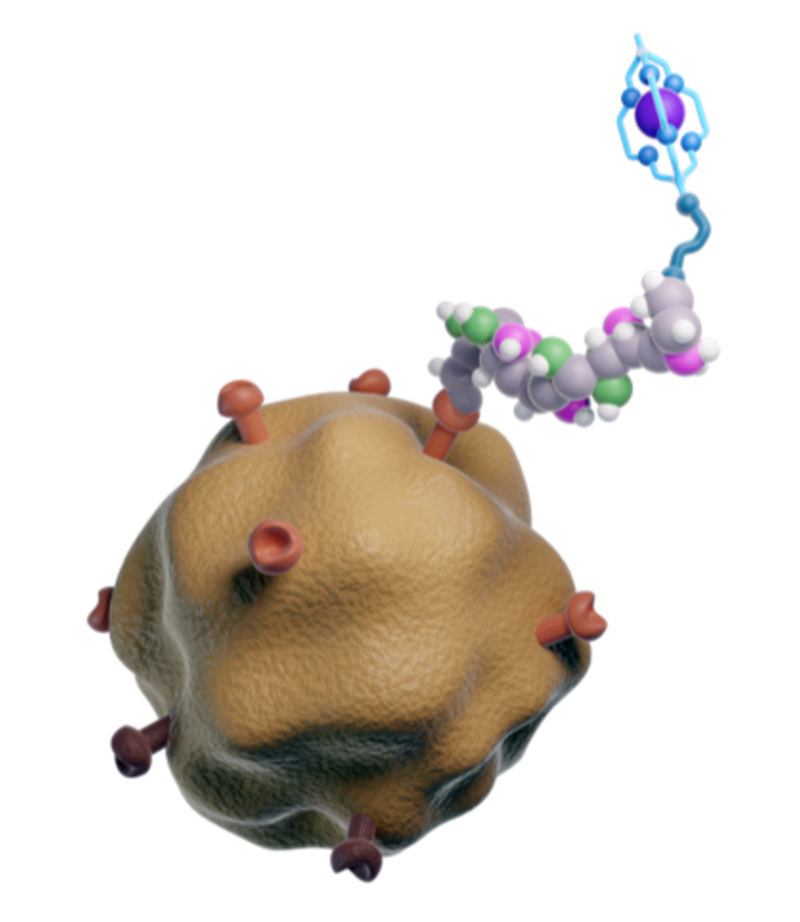First Patient Dosed in COBRA Trial of 64Cu-64 SAR-bisPSMA
 The first participant has been successful treated in the US-based COBRA (Copper-64 SAR-bisPSMA in Biochemically Recurrent prostAte cancer) trial with64Cu SAR-bisPSMA in patients with biochemical recurrence (BCR) of prostate cancer.
The first participant has been successful treated in the US-based COBRA (Copper-64 SAR-bisPSMA in Biochemically Recurrent prostAte cancer) trial with64Cu SAR-bisPSMA in patients with biochemical recurrence (BCR) of prostate cancer.
The Phase I/II Positron Emission Tomography (PET) trial of participants with BCR of prostate cancer following definitive therapy is a multi-center, single arm, non-randomized, open-label trial of 64Cu-labelled SAR-bisPSMA in up to 50 participants. The primary objectives of the trial are to investigate safety and tolerability of Cu-SAR-bisPSMA as well as its ability to correctly detect recurrence of prostate cancer.
Clarity's Executive Chairman, Dr. Alan Taylor, commented, "We are excited to have dosed the first participant in the COBRA trial at the Urology Cancer Center and GU Research Network (GURN) in Omaha, Nebraska, which continues to actively screen and recruit patients. We are very pleased to see our collaboration with Dr Luke Nordquist at GURN grow and evolve as we fully explore the many clinical and logistical benefits of Targeted Copper Theranostics (TCT)."
Prostate cancer is a key focus of Clarity's TCT program. Most recently, Clarity announced a collaboration with GURN on a diagnostic64Cu SAR-bisPSMA investigator-initiated trial (IIT), X-Calibur (NCT05286840) , sponsored by Dr Luke Nordquist. The US-based theranostic64Cu/67Cu SAR-bisPSMA trial, SECuRE (NCT04868604), has been able to successfully image patients with metastatic castrate resistant prostate cancer from 1 hour to 72 hours post-injection. The diagnostic 64Cu SAR-bisPSMA trial in Australia, PROPELLER (NCT04839367), is underway, and will soon reach full recruitment in untreated, confirmed prostate cancer patients (i.e. pre-radical prostatectomy). Clarity has previously received advice from the FDA that its prostate diagnostic clinical program with 64Cu SAR-bisPSMA is addressing the two relevant patient populations for registration: pre-prostatectomy/pre-definitive treatment as well as patients with suspected biochemical recurrence.
Dr. Luke Nordquist, CEO and Urologic Medical Oncologist at the Urology Cancer Center and GU Research Network in Omaha, Nebraska, commented, "We are very excited to have treated the first participant in the COBRA trial and look forward to continuing recruitment at GURN as the more hands-on experience with the TCT platform we gain, the more impressed with these next-generation theranostics we are. Apart from the favorable clinical data acquired in the SECuRE trial at GURN to date, which includes the ability to image tumors between 1 and 72 hours, SAR-bisPSMA enables us to address the significant backlog of patients who cannot access sufficient quantities of PSMA imaging agents based on gallium-68 (Ga-68) or fluorine-18 (F-18) due to the logistical issues of short half-life isotopes. The properties, including the longer half-life of Cu-64, may offer improvements in imaging disease and facilitate central manufacture of the diagnostics, meaning that we can provide critical imaging on-demand and in large scale, delivering the next-generation of technologies to prostate cancer patients and ensuring a timely and accurate diagnosis."
Dr. Taylor said, "Treating the first patient in the COBRA trial is an important step in our prostate cancer program and we look forward to receiving preliminary results in participants with suspected recurrence of prostate cancer. We hope that SAR-bisPSMA will enable improved prostate cancer detection, including low volume disease, which is particularly important in this patient population where early and accurate diagnosis has significant implications for the patients' treatment outcome and prognosis. The preliminary data received from the PROPELLER and SECuRE trials to date is excellent as we have seen high uptake in tumors, and combined with centralized manufacture with on-demand delivery to any zip code in the continental US, this makes SAR-bisPSMA an ideal agent for the pursuit of our ultimate goal of improving treatment outcomes for cancer patients."